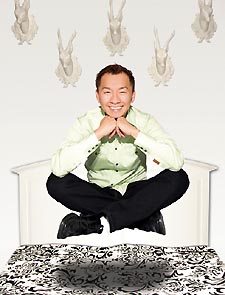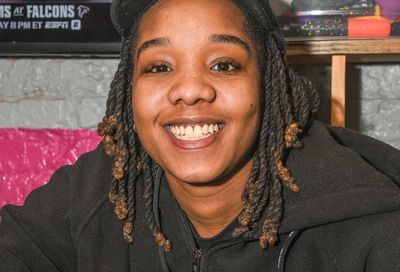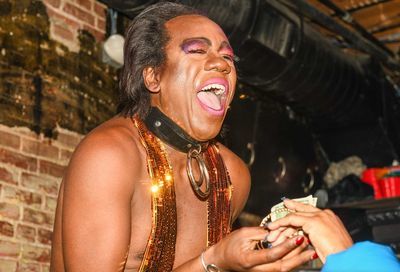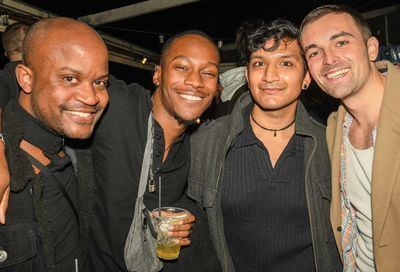Simply Supon
Loving Life with Washington's Design Superstar
Admit it — designers are not the first thing that come to mind when you think of Washington, D.C.
They’re probably not the second thing, either.
But that’s never stopped Supon Phornirunlit — more often known simply as Supon — from forging a wildly successful path as a graphic designer in a city known more for wonkish policy than stylish digs. And even if you don’t know his name, you’ve seen his work for Coca-Cola, IBM, the U.S. Open, the Smithsonian and many, many more.
 Supon |
It’s a big business for the former teen from Thailand who came to the U.S. to finish high school, only to end up founding one of the city’s most renowned design firms, Supon Design Group. After selling the company in 1999 and taking a few years off, Supon now works as Supon Creative, continuing his string of award-winning designs, books, décor and advertising campaigns.
But there’s more than just the stylish eye, as Supon loves his home and hospitality. In his Kalorama homestead, his own personal style is on vibrant display — albeit ever-changing, as he redecorates his townhouse every year.
”I don’t like to do the same thing over and over,” he says with a smile. ”I love change.”
Among his pet projects is Pooch Décor, a line inspired by his own lovable — and well-loved — pets. As he chats in his living room, dogs Cricket and Taylor are constant companions, along with his cat, Logo. The memory of his first dog, the late Pica, remains strong as well. His pets aren’t just inspirational, they help Supon keep control of his life.
”Pets aren’t an accessory for me,” he says. ”I always get so mad when people think that pets are a toy or a fashion accessory. They keep me calm, they force me to go out and play, and they take the stress away.”
With his sparkling sense of style and playfulness, Supon is not just a designer who makes his home in an unlikely city.
He’s simply an original.
METRO WEEKLY: You grew up in Thailand, but you also went to high school in Northern Virginia — you’re kind of a local boy as well. How did you end up coming to this area?
SUPON PHORNIRUNLIT: I came here because my parents wanted me to have the education abroad. At that time, we had a cousin who happened to be living in Alexandria, so my parents sent me to live here. I went to T.C. Williams high school. Then I went to NOVA — Northern Virginia Community College — for two years.
I had been doing some acting in Thailand. And it went a little overboard because I started to skip school. I saw acting as a full-time thing. My parents did not want me doing that, to drop out of school [to become an actor]. I think that’s one of the reasons why they wanted to send me over here, because then I would have to really stay in school.
MW: How old were you?
SUPON: About 17 — it was my last year of high school.
MW: What was the transition like?
SUPON: I hated it. [Laughs.] I absolutely hated it. When I came over here, it was really crazy. I studied English in Thailand — we know how to write it, we know how to read it, but you don’t really speak English to your friends. So when I came over here, I didn’t really know how to speak it. It took a couple years of adjustment.
MW: Did you find a place to fit in?
SUPON: In high school, no, I didn’t really have that many friends. I guess because the culture was so different [from Thailand] — when you come over here you tend to be a little shy, [because] we don’t talk so much. At that time, there weren’t that many Thai students there. When I came over here there was one Thai restaurant for the whole entire city, and now there’s pretty much one on every block. But during that time it was so different.
MW: The D.C. area has large Vietnamese and Korean communities — is there a similarly sized Thai community?
SUPON: It’s not that big, but it’s still pretty big. Thais have their own newspaper, there are many Thai restaurants, and a lot of things have changed. I’ve been here for 20 years, and it’s totally different now. But I don’t really have that many Thai friends. Even like in school, people in different groups tend to hang out with the same kind of people, but I didn’t really do that.
MW: How do you define your circle of friends? Thai, gay, straight?
SUPON: It’s all mixed. Someone else asked me that recently, and I was like, ”I never thought of it that way.” I mean, I have both gay and straight friends, men and women. I never think, ”Okay, I’m going out tonight with my straight friends, and then my gay friends on the weekend.” When I invite people to a party they pretty much mix.
MW: Culturally, what was the biggest difference between the Thailand you grew up in and the U.S. you moved to as a teenager?
SUPON: In the U.S., we have much more freedom — freedom of speech, freedom to do you want to do. People really have no idea — when you look at Asian culture, for instance, we’re so strict that we can’t do a lot of things, we have a lot of things where we have to follow the culture. Here in the U.S. it seems like everyone can’t wait until they’re 18 and they can just do whatever they want to do, you know? I’m actually glad that I was brought up in my culture for 16 or 17 years before I got here. It may be a cliché, but we don’t really know what we have here until you actually go outside of the U.S.
MW: How do you think people in the U.S. view Thailand?
SUPON: You know, most of the time people act like Thailand’s a third world country, you know, that we’re still riding bicycles on the street. It’s much more metropolitan there. A friend actually came to me and said, ”We’re going to go to Thailand — does Thailand have any cars?” They always see people riding a buffalo [on television] and they think that’s what they’re going to see. But when you go there it’s a totally different world.
When the tsunami happened, people who knew that my parents lived in Bangkok called me up and asked, ”Did your parents see any water come into the house?” It was so funny, and I was like, ”I’m glad you’re concerned, but you know that Thailand is not the size of Dupont Circle.”
MW: You said you were trying to be an actor in Thailand, but after you moved here you went into design. Were you interested in design as a career before you came here, or did that come later?
SUPON: There are two things I liked, art and acting. I ended up picking the graphic design — I really like to express myself through the art. I would have liked acting, but after I came here I thought, you know, there aren’t going to be many roles for me. [Laughs.] If I actually went to a drama school — I mean, I don’t want to say that I would be typecast, but 20 years ago I didn’t really see many Asian actors anywhere. But I actually knew since I was a kid what I wanted to do for a living when I grew up.
MW: Talk a little bit about how you got your first company started, the Supon Design Group.
SUPON: After I finished school [at NOVA], I actually wanted to continue for my bachelor degree and maybe get a masters. But I came to see that for design, a degree is important, but it’s not the most important thing. Doctors and lawyers need a degree, but in the design world your portfolio and your work tell much more than your degree. When I was in school, I was pretty good — I always submitted things to [design] contests, and I would win, so after school I had a couple of job offers. I picked one, and I worked there for like a year or two.
Then I thought, I want to do this myself. I was 24 when I started my own business. A lot of people said to me, ”You’re 24 years old, you just got your first job, and you want to do this?” My attitude was, I don’t want to wait until I’m 50 or 60 years old and regret that I didn’t really do it when I was younger. My philosophy was, if I fail, I’m just going to go back and work for somebody. It’s not like you’re just going to drop dead.
So that’s what I determined to do. I had a thousand dollars in the bank, a light table and a fax machine. And I worked out of my apartment.
MW: Looking over your own Web site, I saw that you turned the confusion about your name into your own marketing campaign.
SUPON: When I started the business and started doing cold calling I found that when people are not comfortable with your name — when they look at the message and see ”Supon Phornirunlit called” — sometimes they don’t want to call you back. I had a business consultant suggest that maybe I shouldn’t name the company Supon Design Group, maybe it should be something generic.
But I tried to turn something negative into something positive, so once I actually pinpointed the problem, I just tried making fun of my name. I collected all these mailing labels that have misspelled my name — Futon, Poopon or Coupon — and I published a booklet of them called ”Hello, My Name Is Supon.” When people got that promotion, they started laughing — and it made them remember my name.
Like I say, any problem always has a solution. It’s just how you do it. I think that’s the part of the challenge in anything, really. Once you start making a name for yourself, the referrals will come in, and now I have no problem with my name.
 |
MW: Were you surprised by how fast things happened? It seems like Supon Design Group took off fairly quickly and then you sold it.
SUPON: I sold it during the dot-com boom, in 1999. Keep in mind that I started my company with one assistant and we were working out of my apartment. Then at one peak point we had 40 or so people. Once you have 40 people, it becomes really, really business like. The thing that I loved to do — design — I couldn’t do that any more. You have all these people doing it, and you need to run the business. The more people you have the more projects you need to find, so it’s like a catch-22.
MW: Now that you’re working as Supon Creative, do you limit yourself on how much work you take on?
SUPON: We pick and choose projects. Right now I have about 30 projects. I don’t want it to sound snotty — I don’t have to work, but I love to work. Life is short, so now I want to pick and choose the projects I want to work with. Right now all the clients that I have, I love, because I love to work with them. I also have products, as you see. That’s my pet project. I have home accessories, dinnerware, and Pooch Décor. It’s a variety of things.
MW: I know that being gay in the design world is not a huge surprise…
SUPON: [Laughs.] That’s a stereotype.
MW: The general perception is that it’s easier to be a gay designer than it is to be a gay lawyer because it’s a creative industry. Is that the case?
SUPON: I never had a client who hired me because I’m gay. At least I don’t know of any. I want people to hire me because my skill. I tend to not work with people when that really becomes an issue. It’s like, what’s the point? If you like my work, then hire me because I’m Supon from Supon Creative, not because of my sexual orientation or where I’m from.
MW: Has it ever blocked you in your career?
SUPON: No, but I have turned down jobs because of that. Obviously, the client wouldn’t actually say it, but I’m not a dummy. When the questions start going one way or another, I know what it’s all about. To give you an example, one time a potential client told me that they wanted [a project] to look Asian, so they just wanted to hire me to do the thing. I was like, a good designer can do anything — if you’re going to hire me just because I’m Asian and you want something Asian-looking, then you hired the wrong person.
MW: Did you know you were gay when you came to the U.S., or was it something that came later?
SUPON: It came later, but I do not really know. I mean, I was dating girls throughout college. But my philosophy of life is that people have to accept who I am. I don’t label myself as I’m gay, I’m straight, I’m Asian. I’m just Supon, I’m just me. It may sound funny to you, but that’s how I am. [Laughs.] It never bothered me, and it was always like, if you don’t want to be associated with me, well, I’m not going to be associated with you either.
MW: How do you see the gay communities attitudes towards Asians?
SUPON: You mean accepting Asians? Well, people always think, ”This is 2007, we don’t have any racism.” It’s happened to me from time to time — not just gays and lesbians, but when I’m walking down the street. I expect that to happen sometimes. It’s not going to go away soon. And like I said earlier, I’m only associated with the people who want to associate with me.
MW: What about stereotypes of Asian men in the gay community?
SUPON: Oh, yes, I run into that all the time: ”Oh, you’re a little cutie. You’re a little bottom.” And I’m like, ”No, no and no. And you’re not going to find that out either.” [Laughs.] But it’s not just Asians. In any minority group, people see things. I try to educate people, but you can only educate them so much. But for people who are rude or say something really mean, oftentimes I just ignore it. My mom always told me, ”When the dog barks at you, you don’t bark at the dog.” And that’s true, why become the barking dog?
MW: Is spirituality and Buddhism a part of your life?
SUPON: My family is not strictly religious. They always think that whatever you want to believe in is fine, as long as you’re a good person. If you ask me what I learned from Buddhism, I will say it’s how to relax myself, or just try to make myself calm. These days we live in such a hectic world, and I think that the Buddhism actually helps in that case. But if you ask me if I’m religious, I’m not. Plus, I grew up in a private Catholic school.
MW: What was that like?
SUPON: It was pretty strict. But it also gives you discipline. I remember bitching and complaining, but once you grow up you realize what you’ve gotten from your education, and how much they taught you.
MW: Are you partnered with anyone?
SUPON: Not recently. I had been partnered for nine years. We had decided to move away to L.A. and at the last minute I thought, I love D.C. so much and I just bailed out. I have such a great job here, and great clients and great friends. But we’re still friends.
MW: Is there something that you feel about the city itself that makes you want to stay here? You’re in a field where it seems like you would go to New York or L.A. or something like that.
SUPON: With technology these days, you hardly have to do any of those things. I present things to the clients I’ve never seen in U.K. doing things on the phone and on the internet. But I love D.C. because it’s such a powerful city. This is the capital of the United States, this is where decisions are made for the country. And it actually is really cosmopolitan. I’ve traveled so much, all over really, and I still think D.C. is probably one of the best cities in America.
MW: If you were forced to move out of D.C., what city would you pick?
SUPON: In America?
MW: Anywhere.
SUPON: I’d move back to Bangkok. I never thought of Bangkok as my home until the last couple of years. I actually really love it, from the weather and climate to the people and culture. Sometimes, I feel that in the U.S. things can be lonely. Over there [in Bangkok] it’s totally different. It’s like everybody wants to be your friend, it’s much warmer. Here, I see that a lot of people want to do things like go out every night, searching for somebody. That is not really my style.
My family in Thailand knew everybody in the neighborhood. That usually doesn’t happen here. If you ask me if I can I name all my neighbors here, I can’t. But in Bangkok, I could. Little things like that make it different.
MW: You have a philosophy on your Web site: ”Tastefully accessorize and good fortune will follow.” Where does that come from?
SUPON: To me, you have to be happy as who you are or where you live. Then, I think, the good things will come. You need to make yourself happy first, in order to have good things follow. If you’re not happy, regardless what you have, you’re not going to be happy anyway. That’s what I mean by that.
MW: What kind of role do you think design could or should play in people’s day-to-day lives?
SUPON: I don’t really care what’s in and what’s out. Everything that you see in my home, I can tell you why I bought it. Everything contained in these walls represents myself. And I always tell people good design is just like a good outfit — it has to fit you. That’s why I don’t try to mimic a design that looks fancy, because that’s not me. My philosophy in design is simple and clean and that’s what I always want to do. That’s what reflects my work and where I live.
MW: Obviously, you have a strong sense of personal style. What about someone who’s not as talented or comfortable creating a style for their home or themselves? What would you recommend for someone who’s trying to figure out what their own style?
SUPON: There’s no right and no wrong. People don’t want to take risks. If you want your living space to be really bold and paint your wall in black, go ahead and do it. If you hate it, just repaint it. Your living space pretty much can tell who you are. I always want to have a happy home, and my home makes me happy. But my style wouldn’t fit John Doe or whoever, because this is my style, this is my character. So I always tell people that if you actually want to express yourself through your living space, just go ahead and do it. I have a friend who has wanted to repaint his wall for four years now, and he keeps saying the same thing: ”Oh, I don’t know if it’s going to be the right color for me.” But if you don’t paint it, how are you going to know?
MW: Do you think that’s where some of your talent as a designer comes in? In the ability to see a couple of steps ahead?
SUPON: Yes, but the thing is, I also take risks. And if I don’t like it, I’m just repainting it. That’s all it is.
MW: Design-wise, what would you say is the biggest mistake that you’ve made — something you thought would be cool, but turned out not to be right for you?
SUPON: I hate to say I made a mistake. [Laughs.] As a designer, if things don’t work in some way, I can make adjustments, because that’s what I do for a living. I want to see how I can alter it to make it work. I’m not really one who’s going to be standing there screaming ”Oh my god, I hate this!” I usually say, ”How can I actually change it without redoing the whole thing?” I try to solve the problem first instead of screaming that it doesn’t work.
More information on Supon’s work can be found at www.simplysupon.com and www.suponcreative.com.
Support Metro Weekly’s Journalism
These are challenging times for news organizations. And yet it’s crucial we stay active and provide vital resources and information to both our local readers and the world. So won’t you please take a moment and consider supporting Metro Weekly with a membership? For as little as $5 a month, you can help ensure Metro Weekly magazine and MetroWeekly.com remain free, viable resources as we provide the best, most diverse, culturally-resonant LGBTQ coverage in both the D.C. region and around the world. Memberships come with exclusive perks and discounts, your own personal digital delivery of each week’s magazine (and an archive), access to our Member's Lounge when it launches this fall, and exclusive members-only items like Metro Weekly Membership Mugs and Tote Bags! Check out all our membership levels here and please join us today!























